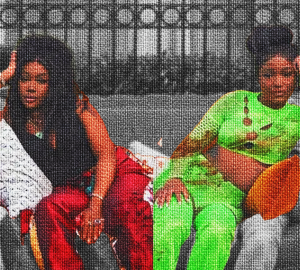“Better Than You” is a bimonthly column about ways for individuals to better themselves. From trying new foods to volunteer work, there are daily activities and tasks a person can do to make their own lives or the lives of others a little bit better.

Picture this: a room filled with strangers sharing personal stories that induce tears, laughter, heartache and that gooey feeling that rises from your gut when you feel like you completely understand what this other humanbeing is saying. This isn’t therapy or Alcoholics Anonymous. This is Carapace.
Carapace is a group of Atlanta storytellers that usually meet at the writing world’s haunt, Manuel’s Tavern, on the fourth Tuesday of every month. But last week, a few regulars welcomed new faces from SCAD at a special event at Ivy Hall Thursday night. The events are held open-mic style, and anyone can tell a story. It just has to be true. Oh, and no notes.
I was a Carapace virgin and quite frankly didn’t even know how to pronounce the name correctly, or what it meant. I walked into Ivy Hall, a place of comfort after spending numerous class hours there, and sat down amidst the other new faces. I immediately felt the nervous tension. It was evident there were a few regulars participating but for the most part, we were all novices. The craving for a good, strong drink swept over me.
The MC for the night took the podium, explained what Carapace was, I learned the proper pronunciation (kar-uh-peys), and eased a bit of the anxiety that was rising by the minute. In the judgement-filled literary world that sometimes forces newcomers and professionals into a hole of seclusion, Carapace’s message is fueling the opposite response. A carapace is a shell, and these nights are to allow the coming out of said shell. Shed the restraints that hold you back, even if it’s simply fear.
The theme for the night was Rebirth, and the rules were simple. No notes, poems or fiction. No political or ex-lover rants. The stories don’t have to factual but they have to be true, and you have a 5-minute time limit before the maracas begin to signal the need for you to wrap it up and return to your seat. There is a black top hat passed around the room, bits of paper and a pen. If the mood has struck you, storytellers new and old are told to put their names in the hat in hopes to be fished out and take over the mic.
Students, faculty, staff and the public stepped up to the podium one by one and shared intimate and personal stories that brought on revelations and emotion. The atmosphere cleared and, although there was still a nervous tension, it was evident that all involved were going through the process of peeling off the layers that had held them silent in their chairs. Even when the stories were sad, there was a positivity blanketing the room, creating a sense of community among people who had probably never even passed each other on the street. Maybe this wasn’t a therapy group but I sure left feeling good. I remained a listener instead of a teller, but even still the stories that were told brought on a sense of, well, for lack of a proper word, betterness.
It was fun and moving, like being part of a theater production. I plan on soaking up the energy and placing my name in the hat next time, becoming a part of the de-shelled clan. Young and old, rich and poor, Carapace creates a commonality and brings to the forefront the similar experiences we share. Maybe you haven’t saved dogs with a group of homeless crack heads, maybe your girlfriend didn’t run off with your best friend, maybe in the second grade you didn’t pretty much force your classmate to have a bowel movement in his pants, but you still know, see and feel what’s beneath it: the emotions that link us, the common knowledge of the what it takes to be human and live this colorful, fascinating life.



























